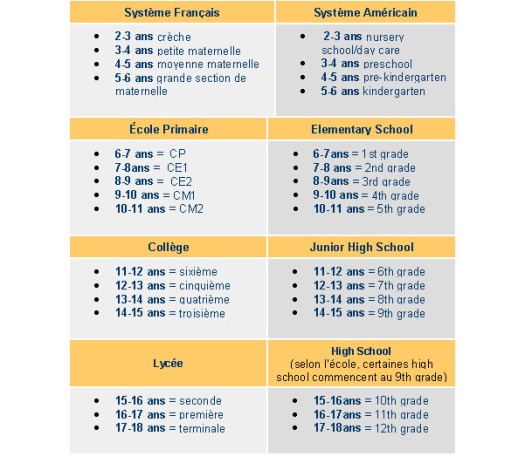
Being an expatriate parent in France isn’t always easy, especially when trying to navigate a different education system. And unfortunately it doesn’t get easier with time, which goes by so fast! Before you know it, just as you seem to have a grasp on école maternelle and primaire, it’s time to register your not so little one for collège. Here is everything you need to know about the process:
First off, depending on where you are from this may come as a surprise, but in France collège is 4 years. Here is a chart summarizing the French vs American system:

For collège, you have three basic options. Your child can attend the public collège of your local district, a private school, or a public collège outside of your district that offers different options, like a sports/study or arts/study program. For these programs, students have a minimum of three hours of practice during the school week. If you choose the last option, contact the collège directly to find out how to sign up. You will also need to request a dispensation (“dérogation”) for your child to attend that collège if it is not in your district.
Some collèges, both public and private, have open house days when you and your child can go and learn more about how things work. Sometimes your child’s CM2 teacher will take the class to the collège for a visit. Don’t hesitate to ask your child’s teacher if such a visit is planned.
Near the end of the CM2 school year, papers will start to come home from elementary school about registering for the collège in your district. If this is your choice, just fill out the enrollment forms and bring them to the collège at the dates and times indicated. The enrollment forms can be complicated to understand, as they use terms you may not have seen elsewhere. Your French friends may not be much help with interpreting the forms if they haven’t been through this before either, and some of the terms are pure educational system jargon that even the French don’t know unless they work in the collège!
Some tips:
- LV1: “langue vivante 1” – that means the first foreign language your child will study. This is generally English, even if your child is an English-speaker.
- LV2: “langue vivante 2”, the second foreign language your child will study. If your child is doing a bilingual program, starting German in 6e, then you would put German here. If your child is not doing the bilingual program, then there is no LV2 until 5e, so just leave this blank.
- Option: Some children may have an “option”, which means an additional, optional course. An example of this is when your child does a sport alongside his studies. Your school may offer options of volleyball, badminton, soccer, rowing, or other sports. Some schools may offer music (CHAM), dance (CHAD), theater (CHAT), or art (CHAAP). Contact your collège to find out what they offer.
- DPT / Externe / DPS: You will need to decide on your child’s meals and transportation.
- The “DP” stands for “demi-pensionnaire“, and this refers to whether your child will eat at the school cafeteria daily. Some schools have various arrangements possible, where you pay a rate per trimester, equaling a lower daily rate, if your child eats at the cafeteria every day.
- If your child eats only occasionally, you may pay a higher daily rate and you may have to pay ahead of time. For transportation (“transporté” vs “surveillé” vs “externe”), your child may take the bus, or not, and be free to leave when his or her classes are over for the day (if not taking the bus), or be free to leave only when the school day is officially over.
- Students are generally not permitted to leave between lessons, so if your child has class from 9 to 10, and 11 to 12, but nothing from 10 to 11, he or she will need to go to study hall during that time.
In some cases, your child may be an “interne” (boarding student) if the collège is far from home and offers the option.
FINANCIAL AID (“BOURSES”)
There is financial aid available for school lunches at the departmental and national level. The collège will let you know how to apply for this, but if you have questions, ask your school’s “gestionnaire.”
PARENT REPRESENTATIVES (“ASSOCIATION DE PARENTS D’ELEVES”)
As in elementary school, there is a parents’ association in collège as well. It works in the same way, with parents being elected by other parents. The elected parents are part of the administrative council of the school and serve as representatives for other parents when issues come up. They also attend the class conference, in which each student’s grades are discussed before report cards are issued.
STUDENT REPRESENTATIVES (“DELEGUE DE CLASSE”)
A class representative, or délegué de classe, is a student from each class elected by his peers to represent the students’ interests. This student may attend administrative council sessions or class conferences, as mentioned above. There is one representative and one alternate per class.
SPORTS ASSOCIATIONS
For the first time in public education, your child is able to participate in sports directly through the school association, called UNSS. Various sports are offered, and these are usually offered during the lunch break or on Wednesday afternoons. You must pay to participate, but the fees are extremely low for the year.
LESSONS
A major change from elementary school is that your child will now have several teachers, one for each subject. Students are split into classes, and the students of each class have the same schedule. They may be split into half-groups for certain classes. Each class has a home room teacher (“professeur principal”), who can be a teacher of any other subject as well, and who takes charge of administrative issues. This teacher serves as your main point of contact if you need to meet with someone concerning your child’s progress, behavior, or other issues that may come up.
26 hours per week of lessons are required in collège. This means that if your child is not taking an optional language or sport, she will have holes in her schedule. If your child remains at school during these hours when she doesn’t have lessons, she can always go to study hall, and at certain times may be able to go to the school library (“centre de documentation”) or the student recreation center (“foyer”).
HOURS
One of the things that may surprise first-time collège parents is how long the school day is. While there are only 26 hours of required instruction, school hours often run from 8 am to 4:30 pm. Once you add in transportation to and from school, and any after school activities, you may find that your child is exhausted, particularly the first week or two. The good news is that kids adapt, so before the Toussaint break, they should be fairly well settled in to the new routine. They may be getting up earlier now than they did in elementary school, so try for as early a bedtime as your family routine allows.
ULIS AND SEGPA
For children with special educational needs, there are special sections available. ULIS (unités localisées pour l’inclusion scolaire) is for children who have been recognized by the MDPH (maison des personnes handicappées) as having particular developmental or other difficulties, and SEGPA is for children who are having trouble in school, where other types of support and help have not yet yielded results.
YOUR POINTS OF CONTACT
CPE: conseiller principal d’education
Besides your child’s home room teacher, the CPE is also a main point of contact if you have a concern about your child (or other children, if your child is facing bullying, for example).
School nurse (infirmière):
Not all collèges have a full-time school nurse. But if your child has diabetes, asthma, allergies, or any other specific medical condition, you need to see the school nurse to fill out a “Project d’accueil individualisé” (PAI). This form explains what measures the nurse or other person in charge needs to take in case of a related medical incident. If the nurse is not always present and your child has any type of emergency medication, ask the nurse where this will be kept so your child has access to it immediately if required.
Orientation counselor (conseiller d’orientation) / pyschologist:
This is frequently the same person. The orientation counselor can help your child envision his next steps in the educational process: a regular high school, a vocational high school, university or technical school, what professions he might be interested in later. Some schools also have career days where people in various professions come and speak with the students in smaller groups.
The office (la vie scolaire):
If your child will be absent, call and let the “vie scolaire” know as soon as you are able. They will call you if your child is not in class and you have not alerted them first.
The principal (principale) or vice principal (principale adjoint):
You can make an appointment to speak with either the principal or vice principal if you have an issue that can’t be addressed with one of the previously noted people. The principal or vice principal will also be involved in any sort of disciplinary council.
CORRESPONDENCE BOOK (“CARNET DE LIAISON”)
As in elementary school, your child still has a “carnet de liaison” for notes home. Students must show this book as they enter or leave the school grounds. They also keep their schedule in this book, and any demerits (“observations”) are also noted here to be signed by the parents. “Observations” are given for not being prepared with class materials or for inappropriate behavior at school. A certain number of “observations” eventually result in detention.
ABSENCES
If your child is absent, you need to call and let the school know. The office that takes care of this is the “vie scolaire.” When your child returns to school, you fill out a note with the reason for the absence in his “carnet de liaison”, which he will need to take to the vie scolaire before he can return to class.
PARENT-TEACHER CONFERENCES
At the end of each of the first two trimesters, you will be invited to parent-teacher conferences. You can sign up to see as many teachers as you like, as far as it fits in their schedule. You can use this time to ask any questions about your child’s grades or behavior or the teacher’s methods, what the class is learning, etc. Some schools give out report cards at the conferences to encourage you to attend.
KEEPING TRACK OF YOUR CHILD’S SCHEDULE AND GRADES
When your child enters collège, you and your child will gain access to a digital portal, “l’Espace Numérique de Travail.” This is a portal that includes information about your child’s schedule, including any last-minute changes due to a teacher’s absence. You can also access Pronotes, a system in which teachers can enter the day’s lessons and homework that’s been assigned, and where you can view your child’s grades and skill levels.
GRADES
Your child may or may not have had number grades in elementary school. In collège, there are both number grades (out of 5, 10, or 20, and with a weighting system) and skill level notations (“compétences”). Many collèges give awards at the end of the year to reward students who have had over a certain grade level all year, or who have shown marked improvement during the year.
“MENTIONS”
When your child gets his grades at the end of the trimester, he may also get a “mention” – something like warning (“mise en garde”), encouragement (“encouragements”), or congratulations (“félicitations”), for example. These can be positive or negative, indicating your child needs to work harder or congratulating your child on her hard work and good results during the year.
CELL PHONES
As of 2018, cell phones are not allowed in collège. In practice, many collèges already had this rule in place. But don’t panic – most schools are reasonable, and the no cell phone rule doesn’t mean your child must travel to and from school without any way of contacting you. It generally just means the cell phone can’t be turned on or used during school hours, or on school grounds. Your child can still turn on the phone before or after school, outside school grounds, if he needs to contact you.
And there is everything you need to know about collège! Look out for the lycée article coming soon!
Alisa Cognard has lived in France for over 20 years. Her two Franco-American children were born here, so she’s been navigating the murky waters of the French educational system for 10 years now. She works as a web programmer, and is an avid reader in her spare time.

